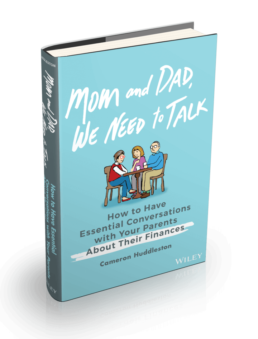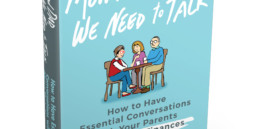There was a box of stuff that once belonged to my dad that sat in my garage for the longest time. My husband had put it by my car as a reminder for me to deal with it. But I put off going through the items in the box because, honestly, I didn’t know what to do with them.
My dad died in 2001 of a heart attack when he was 61. At the time, I didn’t get any of his things. He had died without a will or even a handwritten list spelling out who should get what. So my stepmom—his second wife—hung onto everything. When she died of cancer in 2014, my stepbrother gave me several of my dad’s belonging about a year or two after his mom’s death as he was cleaning out her house to sell it. Over the years, he brought me more items as he had time to go through everything that was left behind by his mom.
There were a few things that belonged to my dad that I really wanted, such as his antique roll-top desk where I now sit whenever I write. But there were many items that I had no use for—legal briefs, framed degrees, certificates showing he was admitted to practice law before various state and federal courts. Tossing them, though, felt like I would be dishonoring my dad.
Stuff, Stuff and More Stuff
Going through what my dad left behind was a cakewalk compared with deciding what to do with all of my mom’s things when I moved her into a memory care facility because her Alzheimer’s disease had progressed to a point where she needed round-the-clock professional care.
In addition to the furniture, artwork, china, silver, jewelry and books she had inherited from her parents, my mom had accumulated plenty of her own things over the years. The newer purchases were easier for me to part with by selling and donating. But I couldn’t simply cast off items that had been passed down to my mom. Several of those things—antiques that had been in my mom’s family for decades, even centuries—I was happy to incorporate in my own home. They were much nicer and better built than anything I could afford.
But for every heirloom that’s in my house, there’s an equal number—or more—in storage containers in my garage and attic. I’m not putting them to use, but I would feel bad if I got rid of them.
Dealing with what your parents leave behind can be a major undertaking. Even if there aren’t many items, it still can be emotionally difficult to have to decide what to keep, toss, sell or donate. Trust me, the process sucks.
To save yourself this headache, I suggest that you start talking to your parents about their stuff while you can. Yes, it probably seems like an awkward conversation. But some of the strategies I suggest for starting conversations with your parents about their finances in my book, Mom and Dad, We Need to Talk: How to Have Essential Conversations With Your Parents About Their Finances, can be used to talk to them about the benefits of pairing down their possessions.
Use Yourself as an Example
If you’ve gone through the process of decluttering, you could share with your parents how you’ve benefited from it. Focus on the positives—such as having a garage you can get through without stepping over boxes or closets you don’t have spend hours searching through to find the things you need. If you sold items you no longer wanted, share how great it was to get some extra cash.
Then, you could offer to help your parents go through their closets, attic, garage or storage spaces to decide which items they truly value and which things they can part with because they’re just taking up space. I recommend doing this before your parents start having any memory problems. I noticed that as my mom’s Alzheimer’s progressed, she became more attached to the things she had. As her memory was slipping away, she still could see and touch these things and didn’t want to part with them.
Give Your Parents a Book to Inspire Them to Declutter
You could give your parents a book about the benefits of decluttering, such as “Let It Go” by Peter Walsh, “The Life Changing Magin of Tidying Up” by Marie Kondo or “The Gentle Art of Swedish Death Cleaning” by Margareta Magnusson, who encourages people to go through what they have so their loved ones don’t have to deal with the burden after they die. Magnusson’s message might help inspire your parents to realize how it would be more of a gift to you to get rid of stuff now rather than let it pass to you someday.
In “Mom and Dad, We Need to Talk,” I recommend getting a third party—such as a family friend, financial professional or clergy member—to help you get through to parents who are reluctant to talk about their finances. These books on decluttering can be like a neutral third party. Your parents might be more likely to take the advice that’s in them than to heed your pleas to do something about all of the stuff they have that you don’t want.
Ask Your Parents to Tell You Which Things They Value Most
You might not want any of your parents’ belongings. However, don’t hurt their feelings by telling them you have no need for anything of theirs.
Instead, acknowledge that you recognize they have an attachment to their things and ask if they could tell you which items they value most. For example, you could say something like, “Of all the things you have in your home, which items do you value most or would like to see passed down to the next generation?”
There are two benefits to doing this. First, getting your parents to think about what is important to them might also help them recognize that they’re hanging onto stuff they don’t need and you probably don’t want to get someday.
The other benefit is that you might learn some interesting stories about your parent’s belongings and realize there are things you actually would like to hang onto after they’re gone. Maybe the dining room table was made by your great-grandfather. Perhaps that dusty book that has a special spot on your parents’ bookshelf was the only thing your grandmother managed to bring with her when she escaped from Nazi Germany.
I found in that box of my dad’s stuff in my garage a pocket watch and pocket knife in a small display cloche. I remember it being on a bookshelf when I was young and my parents still were married. I never got the story behind that watch and never will be able to now that my dad is gone.
I’m not suggesting that you have to keep everything that your parents consider valuable. But knowing the stories behind the things that matter to them might help you decide if it’s something you want to hang onto when they’re gone. And it could make it easier for you to get rid of the things they didn’t mention as valuable to them.
Don’t Issue Ultimatums
Despite your efforts, your parents might refuse to part with anything and might insist that you take everything when they die. Understandably, you might be frustrated that your parents will leave you a bunch of things that you’ll have to waste your time and energy getting rid of because you don’t want them. However, issuing ultimatums such as, “If you leave all this stuff to me, I’m just going to give it away or throw it out,” won’t help. In fact, it will only hurt their feelings and could hurt your relationship with them.
Instead of telling your parents to take their stuff and shove it, there are other tactics that might yield better results and keep your relationship intact. For example, if you know it’s important to your parents that they keep certain items in the family, you could reach out to other family members to see if they are interested in them. If they are, let your parents know that Aunt Sally or Cousin Jim really wants grandma’s china.
If they’re still living in a large home but can’t handle the upkeep or the cost, you could encourage them to downsize to a smaller place that will be easier to maintain and be more affordable—leaving them with more time and money to do things they enjoy. If they agree, they’ll have to get rid of at least some of their stuff when they move.
If worse comes to worse and they refuse to pare down any of their possessions, consider whether there’s any chance you’d want at least some of their things once they’re gone. You might think now that their antique chest of drawers has no place in your home. But you might later come to regret that you didn’t keep it or anything that once belonged to them. As for the things you really don’t want, don’t feel bad about selling them, donating them or even tossing them.
I did finally take the time to go through that box of my dad’s stuff, and it wasn’t nearly as difficult as I thought it would be. I realized that I didn’t need to hang onto most of it to preserve my memories of him.
Don't Miss Out! ORDER NOW!
"An excellent step-by-step guide to navigate what can be time-consuming, uncomfortable conversations."
- Michelle Singletary, The Washington Post
Related Posts
April 23, 2019
5 Smart Money Moves Stay-at-Home Parents Should Make
Parents who leave the workforce to…

Cameron Huddleston
I am the author of Mom and Dad, We Need to Talk: How to Have Essential Conversations With Your Parents About Their Finances. I also am an award-winning journalist with 20 years of experience writing about personal finance. My work has appeared in Kiplinger’s Personal Finance, Forbes.com, Yahoo!, MSN, and other online and print publications.




